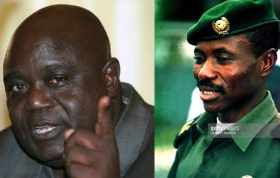Félix Tshisekedi granted a presidential pardon to all those convicted in the murder of Laurent-Désiré Kabila in 2001. Colonel Eddy Kapend and his co-defendants, who have been incarcerated for 15 years, will be released.
The granting of this presidential pardon, and the subsequent release of the 28 convicts (originally 39, 11 have died in custody) in the trial for the murder of Laurent-Désiré Kabila on 16 January 2001, was one of the non-negotiable terms imposed on Félix Tshisekedi by his predecessor, Joseph Kabila.
Eddy Kapend, former army chief of staff, Nono Lutula, former special security adviser to the “Mzee”, Georges Leta, former boss of the National Intelligence Agency, as well as the other convicts still detained, have been behind bars since 2001. However, they are due to be released shortly from Makala, Kinshasa’s central prison, and regain their freedom.
In fact, on Thursday 31 December, President Tshisekedi in his ruling of 7 January 2003, granted total exoneration to any person convicted in this case by the military court from serving the remainder of their sentence.
Political prisoners
Colonel Kapend and his co-defendants, who have always denied their involvement in the assassination of the former Congolese president, the father of Joseph Kabila, were initially sentenced to death. The death sentence was later reduced to life imprisonment.
Considered as political prisoners by several NGOs, including the Bill Clinton Peace Foundation, Kapend and his co-accused were, according to their families, in a difficult situation for several years. Not only were they physically diminished, but they were also struggling financially, as inmates of Makala prison have to provide for their own needs, whether it be food or care.
Pardons for many inmates
These political prisoners were not the only ones to benefit from presidential pardons. The presidential order issued during the night of 31 December to 1 January also specifies that all death sentences are shortened to life imprisonment. Similarly, life sentences are reduced to 20 years of imprisonment.
READ MORE DRC: Félix Tshisekedi pushes back against Joseph Kabila
Reduced prison terms have also been granted to all those sentenced to 5 years or less of penal servitude or forced labour, which formally exists in Congolese law, is no longer applied and results in prison sentences.
All these decisions are justified, in the presidential decree, by the desire to “mark with a special character of humanity, forgiveness, justice and national reconciliation” the prospect of “active participation by all the country’s sons and daughters in the forthcoming reforms initiated by the Head of State.”
However, the presidential order specifies that these measures will not apply to “fugitives” and detainees convicted of crimes against humanity, corruption, embezzlement of public funds and sexual violence.
![]()
























